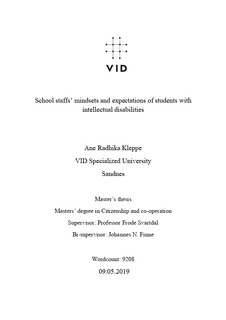| dc.description.abstract | This study aimed to gain an understanding of implicit theories, and attributions about challenging behaviour, among teachers and other school staff in Norwegian schools. The purpose of this current study was twofold: (1) to explore whether teachers attribute challenging behaviour differently than the control group consisting of environment therapists; and (2) to explore if school staffs’ implicit theories attribute expectations differently towards students with intellectual disabilities. In total, staff (N=60) comprised of teachers and other school staff working among students with intellectual disabilities, participated in the study. The respondents completed a questionnaire assessing their mindsets (Norwegian Growth Mindset Measure) and attributions (Challenging behaviour Attribution Scale; CHABA, with seven casual models for challenging behaviour). The results indicated that teachers and other school staff demonstrate a growth mindset towards challenging behaviour. Also, results showed that both groups reported the biomedical, stimulation, and physical environment models as the most plausible causes for challenging behaviour among students with intellectual disabilities. | nb_NO |
